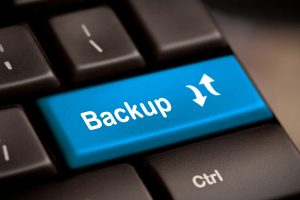 By Joey Pepka of Peptronics
By Joey Pepka of Peptronics
Cyber-attacks are going up for small businesses. Data backup is seriously important. Your hard drive is not enough to keep your data safe. Plainly put, a data backup is a copy or archive of the important information stored on your devices such as a computer, phone, or tablet, and it’s used to restore that original information in the event of a data loss.
What makes a good backup?
- Your data is on multiple devices.
- Your data is in multiple physical locations.
- Your data is in multiple geographic locations.
- User error or forgetfulness can’t hinder the backup process.
- Your backed-up data can’t be stolen.
- Your backed-up data needs to be complete and recent.
- Your backed-up data needs to be easy to access and quick to restore.
- Your backed-up data can be tested.
- In a worst-case scenario, you can survive off just your backup.
What data should I back up?
As a baseline, you should back up anything that can’t be replaced if it’s lost.
For individuals this might include – Address books, Pictures, Videos, Music files, Emails, Documents, Spreadsheets, Financial databases
For businesses, data backups become a bit more technical — think of backing up customer databases, configuration files, machine images, operating systems, and registry files
Data backup solutions and backup storage options
1. Removable media: The smallest storage
Removable media generally refers to small portable devices mostly used to transfer files from device to device. This includes CDs, DVDs, and USB flash drives, also called pen drives, thumb drives, or jump drives, all of which are compatible with laptop and desktop computers. Their size is an indication of their storage capacity, with some supporting as little as 128MB but others capable of storing up to 256 GB.
2. External hard drives: Ample storage
As the name indicates, an external hard drive is connected to the computer or laptop on the outside via cables or wirelessly. Examples of external hard drives can include USB flash drives and solid-state drives, also known as SSDs.
Like removable media, external hard drives are portable and easy to use, but they’re capable of storing larger files — anywhere from 128 GB to 10 TB.
3. Cloud backup: Flexible storage
Cloud backups, or “the cloud” as some affectionately refer to it, allows users to back up their data to hardware that’s in a remote location. Users can access and manage their data anytime on any device via the internet. Most cloud storage services provide a large amount of storage space — by some counts, infinite amounts — and encrypt the content for data security. Some common cloud storage solutions you probably already use include iCloud, Google Drive, or Dropbox*, all of which are compatible with cell phones, tablets, desktop computers, and laptops.
4. Backup services: The most storage
If you have a trove of important data and treasured files, you might want to consider calling in the pros to help with your data backup by hiring a backup service. Essentially, you’re paying a service to manage and help secure your data — most backup services offer encryption. Like the cloud, you can consider the storage options for this unlimited.
https://us.norton.com/internetsecurity-how-to-the-importance-of-data-back-up.html
How often should you back up your data?
How often do you change the data stored on your computer or create new files? You should be backing up your data every time this occurs. Other things you should take into account before deciding how often you should back up your files is the originality and relevance of the data as well as your personal security needs. If you’re an occasional computer user who rarely creates new documents or files, then a monthly backup should do for you.
To stay safe, try to remember to do so at least once a week. If you’re a power user or you use your computer for business, your machine receives heavy use. Several backups throughout the day may be most beneficial if you’re this type of user.
Read more at: http://www.insurance-it-support.com/it-blog/how-often-should-you-backup-your-data.html
ShareJUL




About the Author:
I am a cybersecurity and IT instructor, cybersecurity analyst, pen-tester, trainer, and speaker. I am an owner of the WyzCo Group Inc. In addition to consulting on security products and services, I also conduct security audits, compliance audits, vulnerability assessments and penetration tests. I also teach Cybersecurity Awareness Training classes. I work as an information technology and cybersecurity instructor for several training and certification organizations. I have worked in corporate, military, government, and workforce development training environments I am a frequent speaker at professional conferences such as the Minnesota Bloggers Conference, Secure360 Security Conference in 2016, 2017, 2018, 2019, the (ISC)2 World Congress 2016, and the ISSA International Conference 2017, and many local community organizations, including Chambers of Commerce, SCORE, and several school districts. I have been blogging on cybersecurity since 2006 at http://wyzguyscybersecurity.com